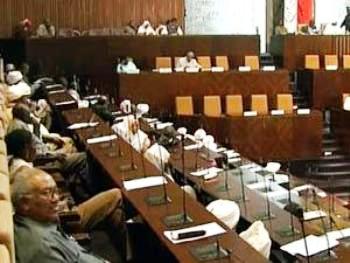Sudan will amend budget to reflect recent oil agreement with Juba
March 16, 2013 (KHARTOUM) – A Sudanese parliamentary official on Saturday said he expects the national assembly to amend the 2013 budget in order to reflect this week’s agreement with South Sudan which allows for the resumption of oil flow exports.

The two countries are increasingly cash-strapped after Juba shut down oil output a year ago in a furious row accusing Khartoum of stealing its crude amid disagreement over transit fees.
Al-Sheik Al-Mak who is a member of the parliament’s economic subcommittee said that part of the new revenue will be used to fund wage increases, another to cover the budget deficit and other items.
Al-Mak told Al-Majhar daily in an interview that he expects Sudan to receive $1.7 billion annually from South Sudan in oil fees adding that this will help stabilize the economic situation and support the beleaguered currency.
The national assembly approved the 2013 budget last year which projects 25.2 billion Sudanese pounds (SDG) in revenues and 35.0 billion SDG in expenses leaving a deficit of 10 billion SDG ($1.5 billion) which equals 3.4% of the country’s Gross Domestic Product (GDP).
Sudan lost 75% of its oil reserves after the southern part of the country became an independent nation in July 2011 denying the north billions of dollars in revenues. Prior to the country’s breakup, Sudan produced close to 500,000 barrels but now its output is limited to 140,000 barrels per day. Oil revenue constituted more than half of the Sudan’s revenue and 90% of its exports.
The value of the Sudanese pound has deteriorated sharply against other major currencies and particularly the U.S. dollar which surpassed 7 SDG in recent weeks compared to an official rate of around 4.4 SDG.
This has fueled inflation which is now at 46% due to the fact that Sudan imports a significant portion of its basic commodities. Ordinary Sudanese citizens are increasingly frustrated about their inability to make ends meet.
In recent days however the exchange rate on the black market improved with news of the agreement on oil.
(ST)
